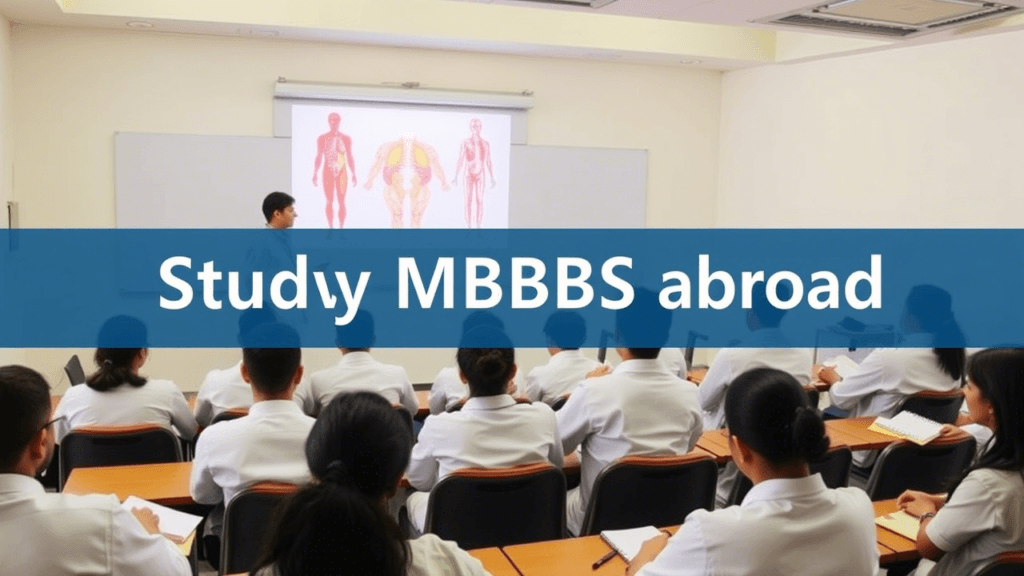Table of Contents
1. Introduction to MBBS Abroad Without NEET
Pursuing a career in medicine is a dream for countless students, but the competitive nature of entrance exams like NEET can be a significant barrier for many. Fortunately, there exists an alternative pathway: studying MBBS abroad without the need to clear NEET. This comprehensive guide is designed to help students navigate the exciting world of international medical education, providing detailed insights into top destinations, admission criteria, cost structures, and more.
Studying MBBS abroad offers not only an opportunity to gain quality education in reputable institutions but also the chance to experience diverse cultures and modern medical practices. In this guide, we will explore every aspect—from the advantages and eligibility requirements to the challenges you might face and how to overcome them. By the end of this article, you will be well-equipped with the knowledge required to make an informed decision about pursuing an MBBS degree outside India without the NEET hurdle.
Our discussion is structured to cater to all your queries, whether you are just beginning your research or are ready to embark on your medical journey. We’ll delve into the intricacies of the admission process, provide a detailed cost comparison across various countries, and highlight the benefits of obtaining a globally recognized medical degree.
2. Advantages of Studying MBBS Abroad Without NEET
Choosing to study MBBS abroad without NEET opens up a myriad of benefits that can set the stage for a successful career in medicine. Here are some of the key advantages:

Simplified Admission Process
Unlike the highly competitive NEET exam in India, many foreign medical institutions offer admissions based solely on your academic performance and eligibility criteria. This often means a smoother and less stressful admission process.
Affordable Tuition and Living Costs
Many overseas institutions provide quality education at a fraction of the cost charged by private medical colleges in India. In addition, several countries offer a reasonable cost of living, making it an economically viable option for many students.
International Recognition and Exposure
A degree from a recognized international university can enhance your global career prospects. Exposure to different cultures and medical practices not only enriches your academic experience but also prepares you for diverse work environments.
No Donation or Capitation Fees
In many cases, studying abroad eliminates the extra burden of hefty donation or capitation fees that are often seen in some private medical colleges in India.
Modern Infrastructure and Facilities
Numerous foreign universities boast state-of-the-art medical facilities, advanced research labs, and clinical training centers that are on par with global standards. This provides an excellent environment for practical learning.
Flexible Admission Timelines
Unlike the rigid timelines associated with NEET in India, many international institutions offer flexible admission dates and multiple intakes throughout the year, allowing you to start your education at a time that best suits you.
Broadened Career Horizons
A global education can open doors to international job opportunities, research collaborations, and postgraduate studies in various parts of the world. It enhances your resume and makes you stand out in a competitive job market.
Diverse Learning Environment
Studying in an international setting exposes you to a mix of cultures, ideas, and medical practices. This diversity can foster a broader perspective on healthcare, equipping you with the skills to adapt to various clinical environments.
By considering these advantages, it becomes clear that studying MBBS abroad without NEET is not just an alternative path—it’s a promising gateway to a world of opportunities, both academically and professionally.
3. Overview of International MBBS Options
In recent years, the trend of pursuing an MBBS degree abroad has gained tremendous popularity among Indian students. The rationale behind this shift is simple: many aspiring doctors are searching for quality education without the intense competition associated with NEET. Let’s explore what international MBBS programs typically offer.
Diverse Curriculum and Teaching Methods
Foreign medical programs often provide a curriculum that is regularly updated to keep pace with the latest advancements in medicine. The teaching methods emphasize practical knowledge, clinical exposure, and research-based learning. This hands-on approach ensures that students are well-prepared for real-world medical challenges.
Global Accreditation and Recognition
When choosing a medical school abroad, one of the key considerations is its accreditation status. Most reputable institutions are recognized by global bodies such as the World Health Organization (WHO) and the National Medical Commission (NMC) in India. This recognition is crucial if you plan to return to India for further studies or practice.
Language of Instruction
Many universities across countries like Russia, China, and the Philippines offer MBBS courses in English, thereby removing language barriers for international students. However, gaining a basic understanding of the local language can be beneficial for day-to-day interactions and clinical practice.
Duration of Study
The duration of MBBS programs abroad generally ranges from 5 to 7 years, inclusive of practical training and internships. This is comparable to the duration of MBBS programs in India, ensuring that the academic rigor remains consistent while providing international exposure.
Opportunities for Specializations and Research
Studying abroad often means access to better research facilities and opportunities for specialization. Many institutions encourage students to participate in research projects, which can be advantageous for those interested in academic medicine or advanced postgraduate studies.
Support Services for International Students
Recognizing the challenges faced by foreign students, many universities offer dedicated support services including language assistance, counseling, and academic guidance. This ensures that students can acclimatize quickly and make the most of their educational experience.
Overall, international MBBS programs offer a blend of rigorous academic training, modern clinical exposure, and a culturally enriching experience. This makes them an attractive option for students who are eager to pursue a medical career without the hurdles posed by entrance examinations like NEET.
4. Top 9 Countries for MBBS Abroad
Choosing the right country is pivotal when considering MBBS abroad without NEET. Here, we present an in-depth look at the top nine destinations that have become popular among Indian students.

1. Russia
Russia is a long-standing favorite for MBBS aspirants due to its affordable tuition, high-quality education, and globally recognized degrees. Universities here boast modern facilities and extensive clinical training programs, making it an excellent option for aspiring doctors.
2. China
China offers a diverse range of MBBS programs taught in English. The country is known for its advanced medical research and affordable education. The vibrant cultural experience and robust support systems for international students add to its appeal.
3. Philippines
The Philippines is renowned for its English-medium instruction and Western-style education system. Many universities here are recognized by global medical bodies, and the country’s tropical climate and friendly culture provide a unique living experience.
4. Ukraine
Ukraine has emerged as a popular destination due to its quality medical education and reasonably priced tuition fees. Many Ukrainian medical universities have international collaborations and offer extensive practical training in state-of-the-art hospitals.
5. Kazakhstan
Kazakhstan is gaining traction among Indian students for its competitive fee structure and comprehensive medical programs. The country offers a blend of Eastern and Western medical practices and ensures a high standard of clinical education.
6. Kyrgyzstan
Kyrgyzstan is known for its accessible education system and affordable living costs. With numerous universities offering MBBS courses in English, it presents a viable option for students looking for quality education without the NEET requirement.
7. Georgia
Georgia offers a unique mix of traditional teaching methods and modern medical practices. The country’s universities are recognized globally, and the friendly environment along with reasonable fees make it an attractive destination for medical studies.
8. Armenia
Armenia is another emerging destination for MBBS studies. With a focus on practical clinical training and a curriculum designed to meet international standards, Armenian institutions are becoming increasingly popular among Indian students.
9. Belarus
Belarus provides a well-rounded medical education with an emphasis on both theoretical knowledge and practical skills. The country’s medical universities are known for their high academic standards and extensive clinical exposure, ensuring that graduates are well-prepared for their medical careers.
Each of these countries offers its own unique set of advantages, from lower tuition fees and living expenses to quality education and global recognition. When deciding on a destination, consider factors such as language of instruction, cultural environment, and post-graduation opportunities to choose the best fit for your academic and career goals.
5. Eligibility Requirements
Even though NEET is not a prerequisite for these international programs, students must meet certain academic and personal requirements. Here’s what you typically need:
Academic Qualifications
- Minimum Marks: Most universities require a minimum of 50% marks in Physics, Chemistry, and Biology (PCB) in your higher secondary exams. For candidates from reserved categories (SC/ST/OBC), the requirement might be slightly lower.
- Completion of Schooling: You should have successfully completed your 12th grade with PCB as your main subjects.
Age Requirements
- Minimum Age: You must be at least 17 years old at the time of admission. Some universities specify that you should be 18 by the time your course begins.
Language Proficiency
- English Competency: Since many courses are taught in English, you might be required to provide proof of English proficiency (IELTS, TOEFL, etc.). Even if the course is in English, picking up basic local language skills can be beneficial for clinical practice and daily life.
Medical Certificate and Health Check-Up
- Health Requirements: Some institutions ask for a medical fitness certificate or proof of a recent health check-up to ensure that you are physically fit for the rigorous demands of a medical program.
Additional Documentation
- Passport and Photographs: A valid passport, passport-sized photographs, and other identification documents are necessary.
- Academic Records: Certified copies of your academic transcripts and certificates must be submitted along with the application.
Meeting these eligibility criteria is crucial for a smooth application process. Make sure to carefully review the specific requirements of each university, as they might have slight variations. Preparing all the necessary documents well in advance will help you avoid last-minute hassles and keep your application process on track.
6. Step-by-Step Admission Process
The admission process for MBBS abroad without NEET is generally straightforward and can be broken down into clear, manageable steps. Here’s a detailed walkthrough:
Step 1: Research and Shortlisting
- Identify Potential Countries and Universities: Start by exploring the top destinations and universities that offer MBBS programs without the NEET requirement. Consider factors like tuition fees, recognition, language of instruction, and cultural fit.
- Check Accreditation: Verify that the institutions are recognized by global bodies such as the WHO and, if you plan to return to India, by the National Medical Commission (NMC).
Step 2: Verify Eligibility
- Review Academic and Age Criteria: Ensure that you meet the minimum marks and age requirements.
- Gather Required Documents: Prepare your academic transcripts, passport, photographs, and any other required certificates.
Step 3: Application Submission
- Online Application: Most universities provide an online application portal. Fill out the form carefully, ensuring that all the details are accurate.
- Application Fees: Pay the necessary application fee if applicable.
Step 4: Admission Offer and Confirmation
- Receive Admission Letter: Once your application is reviewed, you will receive an offer letter from the institution.
- Confirm Your Seat: Follow the instructions provided in the offer letter to confirm your acceptance, which might include a fee deposit.
Step 5: Visa and Travel Arrangements
- Apply for a Student Visa: With your admission letter in hand, apply for a student visa at the respective country’s embassy or consulate.
- Plan Your Travel: Book your flight tickets and arrange for accommodation. Many universities also offer guidance on housing and orientation services for international students.
Step 6: Pre-Departure Preparation
- Medical Check-Up and Insurance: Complete any required health check-ups and secure appropriate health insurance coverage.
- Orientation and Cultural Training: Some institutions provide pre-departure orientations to help you adapt to the new environment.
Following these steps methodically will ensure that you have a smooth transition from application to your first day in class. It’s advisable to start this process well in advance to avoid any last-minute challenges.
7. Tuition Fees and Living Costs Comparison
Understanding the financial aspects is crucial when planning to study MBBS abroad. Below is a comparative overview of tuition fees and living costs in some popular destination countries:
| Country | Annual Tuition (USD) | Estimated Annual Living Cost (USD) |
|---|---|---|
| Russia | 3,500 – 7,000 | 2,000 – 3,500 |
| China | 4,000 – 8,000 | 2,500 – 4,000 |
| Philippines | 3,000 – 6,000 | 2,000 – 3,000 |
| Ukraine | 4,000 – 6,500 | 2,500 – 4,000 |
| Kazakhstan | 3,000 – 5,500 | 2,000 – 3,000 |
| Kyrgyzstan | 3,000 – 5,000 | 1,800 – 2,500 |
| Georgia | 3,500 – 6,000 | 2,000 – 3,200 |
| Armenia | 2,500 – 5,000 | 1,800 – 2,500 |
| Belarus | 3,500 – 7,000 | 2,000 – 3,500 |
This table serves as a basic guide—actual costs may vary depending on the city, lifestyle, and individual spending habits. It’s important to factor in other expenses such as travel, books, and additional fees when planning your budget.
8. Renowned Universities and Colleges
When it comes to medical education, the reputation of your institution plays a significant role in shaping your career. Here are some well-regarded universities offering MBBS programs abroad without NEET:
Russia
- Orenburg State Medical University: Known for its modern facilities and extensive clinical training programs.
China
- Harbin Medical University: Offers a robust curriculum with courses taught in English and ample research opportunities.
Philippines
- University of Perpetual Help: Renowned for its high-quality education and strong emphasis on practical learning.
Ukraine
- Bogomolets National Medical University: A prestigious institution with international collaborations and a focus on research.
Kazakhstan
- Kazakh National Medical University: Provides an integrated curriculum combining theoretical and practical training.
Kyrgyzstan
- Osh State Medical University: A popular choice among Indian students for its affordable fees and English-medium instruction.
Georgia
- Tbilisi State Medical University: Known for its comprehensive clinical training and global recognition.
Armenia
- Yerevan State Medical University: Offers a balanced curriculum with a strong emphasis on both theory and clinical practice.
Belarus
- Vitebsk State Medical University: Recognized for its quality education and extensive hands-on training in modern hospitals.
When considering these universities, always check their latest accreditation statuses and student reviews. This due diligence helps ensure that your degree is recognized both internationally and in India.
9. Scholarship and Financial Aid Options
Studying abroad can be financially demanding, but numerous scholarship and financial aid opportunities are available to ease the burden. Here’s a look at some of the popular options:
Government Scholarships
- Russian Government Scholarship: Offers full or partial funding to international students based on merit.
- Chinese Government Scholarship: Available for students enrolling in select medical programs.
University-Specific Grants
Many institutions provide their own scholarships to attract international talent. These grants can cover tuition fees, living expenses, or both. It’s worth exploring the university’s website for specific details.
Private and International Organizations
There are also various foundations and international organizations that offer financial aid to students pursuing higher education in medicine. Researching these opportunities well in advance can significantly reduce your financial burden.
Taking advantage of these scholarships not only helps financially but also adds to your academic credentials. Always prepare a strong application with a well-crafted statement of purpose and relevant documents to boost your chances of receiving funding.
10. Recognition and Validity in India
One of the foremost concerns for many students is whether an MBBS degree earned abroad will be accepted in India. Here’s what you need to know:
Global Accreditation
Ensure that the university you choose is recognized by global bodies such as the World Health Organization (WHO) and the relevant medical councils. This recognition is crucial for the degree’s validity both internationally and in your home country.
Screening Tests for Indian Practice
If you wish to practice in India after completing your MBBS abroad, you will need to clear the Foreign Medical Graduate Examination (FMGE) or its successor. This exam is mandatory to register with the National Medical Commission (NMC) in India.
Verification of University Credentials
Before finalizing your admission, always verify the university’s credentials and check recent student testimonials. A well-recognized degree can open numerous career opportunities both in India and abroad.
For more details on recognition, you can visit the National Medical Commission website.
11. Benefits of International Exposure in Medicine
Studying medicine abroad is not just about academic learning—it’s an immersive experience that can shape your personal and professional growth. Here’s how international exposure can benefit you:
Diverse Clinical Experience
Working in hospitals with varied patient demographics exposes you to a range of medical conditions and treatment protocols. This diversity enhances your clinical skills and prepares you for global medical challenges.
Cultural Enrichment
Living in a different country broadens your horizons. You learn new languages, customs, and traditions, which can be invaluable in today’s interconnected world. Such experiences often build character and enhance interpersonal skills.
Networking Opportunities
International study environments offer ample networking opportunities with students, professors, and healthcare professionals from around the globe. These connections can prove beneficial for future collaborations and job opportunities.
Advanced Research and Innovation
Many foreign institutions invest heavily in medical research. Being part of such an ecosystem not only enriches your academic experience but also paves the way for innovations in patient care and treatment methodologies.
Personal Growth and Independence
Navigating life in a new country builds resilience, adaptability, and self-reliance. These qualities are essential for any healthcare professional who must handle high-pressure situations with confidence.
12. Common Challenges and Solutions
While the advantages are plentiful, studying MBBS abroad also comes with its set of challenges. Recognizing these obstacles in advance can help you prepare and overcome them effectively.
Language Barriers
Even if your course is taught in English, local languages might be necessary for interacting with patients. Solution: Enroll in basic language courses or practice with language learning apps.
Cultural Adjustment
Adapting to a new cultural environment can be overwhelming. Solution: Engage in orientation programs offered by universities, join student communities, and participate in local cultural events.
Regulatory Exams (FMGE)
To practice in India, you must clear the FMGE or equivalent screening tests. Solution: Begin early preparation during your course and attend coaching classes if needed.
Financial Concerns
Studying abroad can be expensive despite lower tuition fees compared to some Indian institutions. Solution: Explore scholarships, grants, and part-time job opportunities available for international students.
Homesickness and Social Isolation
Being away from family and familiar surroundings might be challenging. Solution: Stay connected through social media, join local Indian student associations, and participate in cultural meet-ups.
By anticipating these challenges and planning accordingly, you can minimize their impact and enjoy a rewarding academic journey.
13. Career Prospects After MBBS Abroad
A degree in medicine from an international institution can open up a world of career opportunities. Here’s a look at what lies ahead:
Practicing in India
After completing your MBBS, you can appear for the FMGE/NEXT exam to obtain a license to practice in India. A globally recognized degree often adds weight to your profile during competitive job placements.
Opportunities Abroad
Graduates from reputed international universities are well-positioned to work in hospitals and research institutions around the world. The exposure to advanced medical practices and diverse clinical environments can be a significant advantage.
Postgraduate Studies and Specializations
Many students choose to further specialize by pursuing MD or MS programs either in India or internationally. A solid foundation gained abroad can ease the transition to advanced studies and research-based roles.
Research and Academia
With access to modern laboratories and research facilities during your studies, you may choose to pursue a career in medical research or academia. Many institutions value international research experience, which can lead to exciting career prospects in innovation and teaching.
Private Practice and Entrepreneurship
Armed with global knowledge and diverse clinical skills, many doctors eventually start their own private practices or medical enterprises. The international exposure can also foster a spirit of entrepreneurship and innovation in healthcare services.
14. Frequently Asked Questions (FAQs)
Q1. Can I really pursue MBBS abroad without clearing NEET?
Yes, numerous countries allow Indian students to enroll in MBBS programs without requiring NEET scores, provided you meet the academic and other eligibility criteria of the institution.
Q2. Is the MBBS degree earned abroad recognized in India?
The degree is recognized if the institution is accredited by international bodies and the National Medical Commission (NMC) in India. However, you must clear the FMGE or similar screening tests to practice in India.
Q3. Which countries are considered the best for studying MBBS without NEET?
Russia, China, the Philippines, Ukraine, Kazakhstan, Kyrgyzstan, Georgia, Armenia, and Belarus are among the top destinations offering MBBS programs without NEET.
Q4. How much does it cost to study MBBS abroad?
The costs vary by country and institution. On average, tuition fees range from USD 3,000 to USD 8,000 per year, with living expenses varying between USD 1,800 and USD 4,000 annually.
Q5. Are there scholarship opportunities available for international MBBS students?
Yes, many universities and governments offer scholarships and financial aid options. It’s important to check the specific scholarship criteria and deadlines on the institution’s official website.
Q6. What support is available to international students adjusting to life abroad?
Universities typically offer orientation programs, language classes, and dedicated support services to help international students settle into their new environment.
15. Final Thoughts and Conclusion
In summary, pursuing MBBS abroad without NEET can be a transformative opportunity for students who dream of a career in medicine but are challenged by the competitive entrance exam landscape in India. With globally recognized degrees, affordable fees, and a rich cultural experience, studying medicine abroad is an increasingly attractive option.
While the journey may come with challenges such as cultural adjustment, language barriers, and additional regulatory requirements, careful planning and a proactive approach can help you overcome these obstacles. Thorough research into eligibility criteria, university accreditation, and financial planning is key to making an informed decision.
If you’re ready to explore a world of opportunities in medical education, consider the top 9 destinations we’ve discussed. With the right preparation, guidance, and determination, you can embark on a successful medical career that not only meets your academic goals but also enriches your personal and professional life.
Remember, the decision to study MBBS abroad is not merely about acquiring a degree—it’s about embracing a global perspective on healthcare, gaining invaluable international exposure, and paving the way for a fulfilling and versatile career in medicine.


